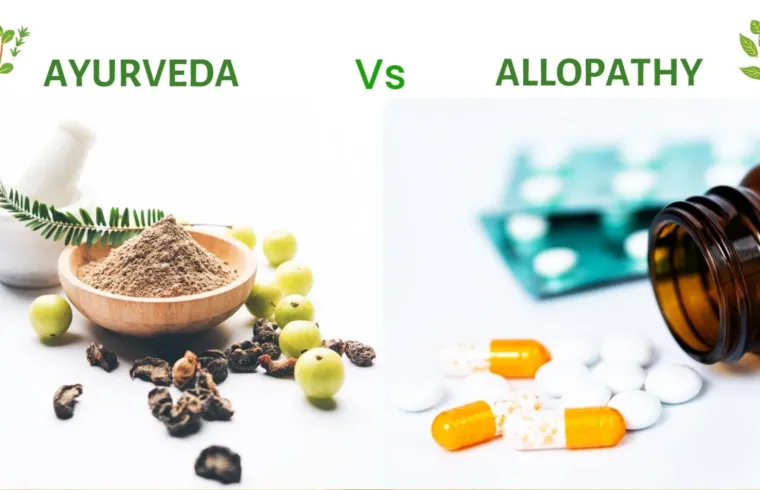Introduction
Healthcare has evolved over centuries, offering different approaches to treating illnesses. Two of the most prominent medical systems are Ayurveda and Allopathy. While Allopathy (modern medicine) focuses on quick relief through pharmaceutical drugs and surgeries, Ayurveda (ancient Indian medicine) emphasizes natural healing, lifestyle balance, and long-term well-being.
This article explores how Ayurveda can transform life compared to Allopathy and why more people are shifting towards holistic healing.
1. Understanding Ayurveda and Allopathy
What is Ayurveda?
🔹 Originated in India over 5,000 years ago. 🔹 Based on the principles of balance (Doshas – Vata, Pitta, Kapha). 🔹 Uses natural herbs, diet, yoga, and meditation. 🔹 Aims for long-term healing by treating the root cause of diseases.
What is Allopathy?
🔹 Modern medicine practiced worldwide. 🔹 Uses chemical-based drugs, antibiotics, and surgeries. 🔹 Provides instant relief from symptoms. 🔹 Focuses on treating diseases rather than prevention.
2. Key Differences Between Ayurveda and Allopathy
| Factors | Ayurveda | Allopathy |
|---|---|---|
| Approach | Natural healing, holistic | Symptom-based treatment |
| Medicine Type | Herbal remedies, plant extracts | Synthetic drugs, chemicals |
| Healing Process | Slow but long-lasting | Fast but may have side effects |
| Side Effects | Minimal, as herbs are natural | Possible long-term side effects |
| Focus | Root cause of illness | Immediate relief from symptoms |
| Preventive Care | Strong focus on disease prevention | Limited focus on prevention |
| Personalization | Tailored to individual body type (Doshas) | One-size-fits-all approach |
| Dependency | Encourages self-healing and immunity | Higher dependency on medicines |
3. How Ayurveda Can Transform Life
A. Natural Healing Without Side Effects
✔ Uses plant-based medicines, oils, and minerals. ✔ No harmful chemicals or artificial ingredients. ✔ Enhances the body’s self-healing capability.
B. Focus on Root Cause, Not Just Symptoms
✔ Treats the actual cause of diseases rather than masking symptoms. ✔ Example: Instead of just relieving acidity with antacids, Ayurveda focuses on digestive health.
C. Strengthens Immunity & Longevity
✔ Ayurvedic herbs like Ashwagandha, Turmeric, and Amla naturally boost immunity. ✔ Reduces the risk of chronic diseases like diabetes, hypertension, and arthritis. ✔ Promotes longer and healthier life with lifestyle changes.
D. Personalized Treatment Based on Body Type
✔ Ayurveda classifies people into three Doshas – Vata, Pitta, and Kapha. ✔ Treatments are tailored to individual body constitutions. ✔ Leads to better health management and fewer relapses.
E. Balances Mind, Body, and Soul
✔ Includes Yoga, Meditation, and Pranayama (breath control). ✔ Reduces stress, anxiety, and depression naturally. ✔ Enhances mental clarity, focus, and emotional well-being.
F. Preventive Healthcare for a Disease-Free Life
✔ Encourages seasonal detox (Panchakarma) to remove toxins. ✔ Guides proper daily routine (Dinacharya) and diet habits. ✔ Prevents lifestyle diseases like obesity, diabetes, and heart problems.
4. Can Ayurveda and Allopathy Work Together?
While Ayurveda is great for long-term healing, Allopathy is useful for emergency treatments and critical care (e.g., surgeries, infections, accidents). Many people now prefer an integrated approach, where Ayurveda helps with prevention and chronic conditions, while Allopathy is used for acute medical emergencies.
Conclusion: Ayurveda for a Healthier Future
Ayurveda is not just a treatment; it’s a way of life that promotes natural healing, disease prevention, and overall well-being. While Allopathy provides quick relief, Ayurveda ensures long-term health, fewer side effects, and holistic healing. If you want to transform your life, incorporating Ayurveda into your daily routine can bring sustainable health benefits.
👉 Would you try Ayurveda for a healthier lifestyle? Share your thoughts in the comments!










